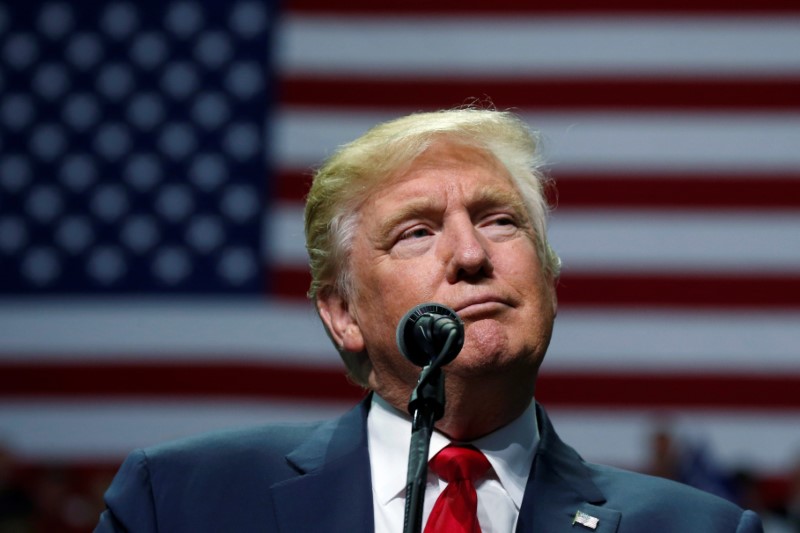By Jamie McGeever
LONDON, Oct 12 (Reuters) - If the 40-year wave of globalization is now giving way to a rising tide of protectionism, the outlook for national and regional champions is brightening.
These companies are most likely to be in sectors that enjoy explicit if not implicit government backing, and are those best positioned to increase domestic market share in a world where barriers to trade and markets are going up, not coming down.
Early signs of these trends may already be starting to emerge as the de-globalization drift deepens, with the Trump administration's "America First" world view sowing doubt over how global trade will evolve in the years and decades ahead.
It's almost a year since Donald Trump's shock U.S. election win. In that time he has withdrawn the United States from the Trans-Pacific Partnership (TPP), threatened to withdraw from the North American Free Trade Agreement (NAFTA) and chided Germany for its huge trade surplus.
And at a micro level a trade dispute between Boeing (NYSE:BA) BA.N and Bombardier BBDb.TO threatens thousands of jobs at the Canadian planemaker' s plant in Northern Ireland. UK prime minister Theresa May has spoken to Trump about the issue.
With Trump turning up the protectionist rhetoric, French President Emmanuel Macron has vowed to make it more difficult for foreign takeovers in strategic European industries, warning European Union governments to guard against "naivety" in global trade.
Last month Paris and Rome said they will explore the creation of a Franco-Italian naval defence group, merging French military shipyards company Naval Group with Italian shipbuilder Fincantieri FCT.MI . Siemens SIEGn.DE and France's Alstom ALSO.PA also announced last month they would merge their rail businesses, creating a European champion to help counter the rise of China's state-owned CRRC 601776.SS . and acquisition data from Thomson Reuters show the value of intra- and inter-EU deals in the nine months to September jumped 68 percent to $344 billion, the highest since 2008.
The value of inward M&A into Europe from overseas also rose Jan-Sept, but nowhere near as much. It edged up 1 percent to $178 billion, only the highest since 2015, and inbound flows excluding Chinese acquisitions rose 4 percent to $153 billion, also just a two-year high.
The picture in the United States is a little less clear cut, but still points to a general trend of home-grown deal-making.
The value of U.S. domestic M&A rose 6 percent in the first nine months of 2017 to $690 billion, again the highest in just two years. But the number of domestically-focused deals jumped 21.8 percent to 7,846, the most since 1998 and the second highest ever.
PEAK GLOBALIZATION?
Michael O'Sullivan, Chief Investment Officer at Credit Suisse (SIX:CSGN)'s International Wealth Management division, with 702 billion francs ($722 billion) of assets under management, recommends investors switch their attention away from globalized companies toward market champions as globalization slows.
"These are the firms that will see a rise in domestic market share and enjoy possible government support," he said. "M&A is likely to be more intra-regional, especially in Europe. Until recently, Europe was a collection of countries. But people now, including EU policymakers, see a more pan-Europe."
O'Sullivan expects cross-border ventures in European technology and rail to spread. Banking, he said, is ripe for consolidation over the next five years, particularly among the big European banks with strong balance sheets.
Deutsche Bank (DE:DBKGn) analysts argue that last year marked the "the peak, and likely unwind of globalization" that has driven and shaped the world economy since World War Two. There is "compelling evidence" that the freedom of movement of goods, people and capital across the globe are all being reversed.
The shift towards unilateralism is most prevalent in places that have been the biggest drivers of globalization.
Global Trade Alert, which monitors state interventions, says the United States has implemented 214 "harmful" trade measures over the last two years. That's more than any other country by far, and more than double second-placed India, which has adopted 105 protectionist measures.
Britain, Italy, Germany and France were all in the top 10, while China was in 11th place. (http://www.globaltradealert.org)
<^^^^^^^^^^^^^^^^^^^^^^^^^^^^^^^^^^^^^^^^^^^^^^^^^^^^^^^^^^^ European M&A
http://reut.rs/2z2Egue Globalization - faltering growth
http://reut.rs/2yuiXo2 Globalization - long term
http://reut.rs/2z2FNAu Globalization - short term
http://reut.rs/2ytBEsc
^^^^^^^^^^^^^^^^^^^^^^^^^^^^^^^^^^^^^^^^^^^^^^^^^^^^^^^^^^^>
